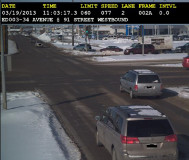Article from: www.thenewspaper.com/news/45/4506.asp
9/5/2014
Canada: Speed Cameras Change Misses Revenue Target By $47 Million
When Edmonton, Canada takes over some speed camera operations, expenses rise $47 million more than expected.
 Tired of dealing with the corruption scandals of photo enforcement vendors, the city council of Edmonton, Canada decided in 2007 to go it alone. Instead of sharing a cut of every ticket with Dallas-based Affiliated Computer Services (ACS), Edmonton the plan was to do all the work and keep all the revenue for itself. The move proved to be much less lucrative than expected, the city auditor found in a report issued last week.
Tired of dealing with the corruption scandals of photo enforcement vendors, the city council of Edmonton, Canada decided in 2007 to go it alone. Instead of sharing a cut of every ticket with Dallas-based Affiliated Computer Services (ACS), Edmonton the plan was to do all the work and keep all the revenue for itself. The move proved to be much less lucrative than expected, the city auditor found in a report issued last week.
In the United States and most of Canada, photo ticketing vendors provide a "turn key" service, which means the private firm is in charge of every aspect of the program. Companies like Redflex, American Traffic Solutions and ACS (now Xerox) scout out the most promising locations to place a camera, which are then installed, maintained and owned by the company. The vendor takes the photos, decides who is guilty, prints and mails the tickets, collects the fines and deposits the cash in a city bank account. If the fine is contested, the vendor creates an "evidence package" for the city and provides all the legal support needed, often including "training" for judges. If the fine isn't paid, the vendor (for an extra fee) tries to collect. The private company will conduct polling, create marketing campaigns, write statements for the police chief, track of accident statistics and generate reports meant to show the success of the program.
Edmonton began its quest for independence by keeping ACS on only to decide guilt, mail tickets and collect the fines. The city would do the rest, expecting within two years to be able to take over the ticket-printing function.
The city also predicted it would use 29 speed cameras to generate 750,000 tickets over five years at a cost of $6,675,000. Instead, the city used 67 cameras to issue 1,173,000 with $53,629,815 in costs -- $19 million of which went to ACS.
The cameras were still highly profitable, issuing $116.8 million worth of tickets between 2009 and 2013, putting a net profit of $73.3 million in the city's coffers.
The city's drive to maximize profit has reduced the operating cost for each ticket from $32.85 in 2009 to $10.71 last year. ACS used to receive $19 per ticket when it ran the entire program.
Edmonton has had a rocky history with cameras. In 2011, the city was forced to cancel 141,729 tickets worth about $17 million after serious doubts were raised over the accuracy of "speed on green" tickets.
Edmonton was also home to one of the first photo ticketing bribery scandals. Evidence showed that police officers took expensive hockey tickets and free travel from ACS -- including the services of a blonde company escort -- in return for a no-bid contract worth $90 million. A judge dismissed the charges after declaring prosecutors had failed to establish a clear quid pro quo.
When Edmonton Sun columnist Kerry Diotte wrote about the scandal, criticizing the city's photo radar effort, police officers set up a sting operation on November 18, 2004 to entrap Diotte at the Overtime Bar and arrest him for drunk driving. Diotte had foiled the plan by taking a cab home. Diotte went on to serve on the city council from 2010 to 2013.
A copy of the report is available in a 600k PDF file at the source link below.
Source: Automated Photo Enforcement Review (Edmonton, Canada City Auditor, 8/27/2014)
Permanent Link for this item
Return to Front Page
 Tired of dealing with the corruption scandals of photo enforcement vendors, the city council of Edmonton, Canada decided in 2007 to go it alone. Instead of sharing a cut of every ticket with Dallas-based Affiliated Computer Services (ACS), Edmonton the plan was to do all the work and keep all the revenue for itself. The move proved to be much less lucrative than expected, the city auditor found in a report issued last week.
Tired of dealing with the corruption scandals of photo enforcement vendors, the city council of Edmonton, Canada decided in 2007 to go it alone. Instead of sharing a cut of every ticket with Dallas-based Affiliated Computer Services (ACS), Edmonton the plan was to do all the work and keep all the revenue for itself. The move proved to be much less lucrative than expected, the city auditor found in a report issued last week.